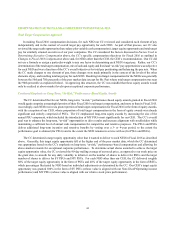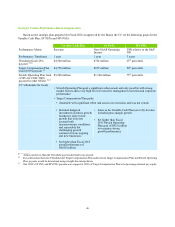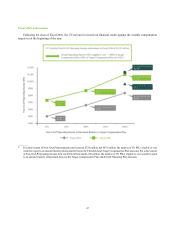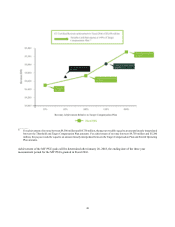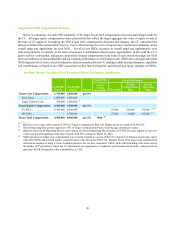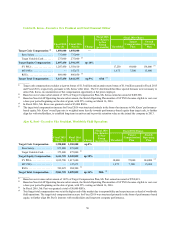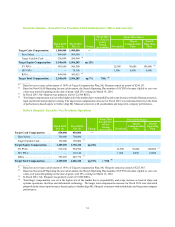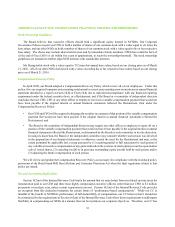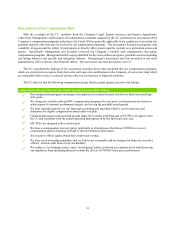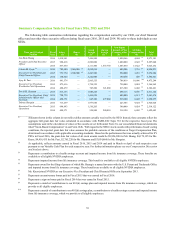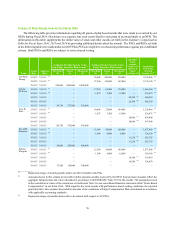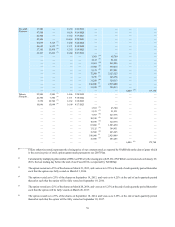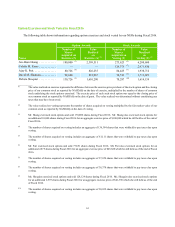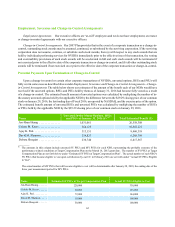NVIDIA 2016 Annual Report Download - page 70
Download and view the complete annual report
Please find page 70 of the 2016 NVIDIA annual report below. You can navigate through the pages in the report by either clicking on the pages listed below, or by using the keyword search tool below to find specific information within the annual report.52
ADDITIONAL EXECUTIVE COMPENSATION PRACTICES, POLICIES AND PROCEDURES
Stock Ownership Guidelines
The Board believes that executive officers should hold a significant equity interest in NVIDIA. Our Corporate
Governance Policies require our CEO to hold a number of shares of our common stock with a value equal to six times his
base salary, and our other NEOs to hold a number of shares of our common stock with a value equal to his or her respective
base salary. The shares may include shares held in trust and by immediate family members. NEOs have until the later of
(i) the end of Fiscal 2016 or (ii) within five years of appointment, to reach the ownership threshold. The stock ownership
guidelines are intended to further align NEO interests with stockholder interests.
Mr. Huang holds stock with a value equal to 732 times his annual base salary, based on our closing price as of March
21, 2016. All of our other NEOs hold stock with a value exceeding his or her respective base salary, based on our closing
price as of March 21, 2016.
Compensation Recovery Policy
In April 2009, our Board adopted a Compensation Recovery Policy which covers all of our employees. Under this
policy, if we are required to prepare an accounting restatement to correct an accounting error on an interim or annual financial
statement included in a report on Form 10-Q or Form 10-K due to material noncompliance with any financial reporting
requirement under the federal securities laws, or a Restatement, and if the Board or a committee of independent directors
concludes that our CEO, CFO or any other officer or employee received a variable compensation payment that would not
have been payable if the original interim or annual financial statements reflected the Restatement, then under the
Compensation Recovery Policy:
• Our CEO and CFO will be required to disgorge the net after-tax amount of that portion of the variable compensation
payment that would not have been payable if the original interim or annual financial statements reflected the
Restatement; and
• The Board or the committee of independent directors may require any other officer or employee to repay all (or a
portion of) the variable compensation payment that would not have been payable if the original interim or annual
financial statements reflected the Restatement, as determined by the Board or such committee in its sole discretion.
In using its discretion, the Board or the independent committee may consider whether such person was involved
in the preparation of our financial statements or otherwise caused the need for the Restatement and may, to the
extent permitted by applicable law, recoup amounts by (1) requiring partial or full repayment by such person of
any variable or incentive compensation or any gains realized on the exercise of stock options or on the open-market
sale of vested shares, (2) canceling (in full or in part) any outstanding equity awards held by such person and/or
(3) adjusting the future compensation of such person.
We will review and update the Compensation Recovery Policy as necessary for compliance with the clawback policy
provisions of the Dodd-Frank Wall Street Reform and Consumer Protection Act when the final regulations related to that
policy are issued.
Tax and Accounting Implications
Section 162(m) of the Internal Revenue Code limits the amount that we may deduct from our federal income taxes for
remuneration paid to our CEO and three most highly compensated executive officers (other than our CFO) to $1 million
per person covered per year, unless certain requirements are met. Section 162(m) of the Internal Revenue Code provides
an exception from this deduction limitation for certain forms of “performance-based compensation”. While our CC is
mindful of the benefit to NVIDIA’s performance of full deductibility of compensation, our CC believes that it should not
be constrained by the requirements of Section 162(m) of the Internal Revenue Code where those requirements would impair
flexibility in compensating our NEOs in a manner that can best promote our corporate objectives. Therefore, our CC has




